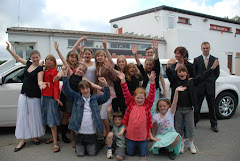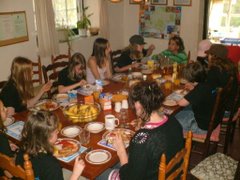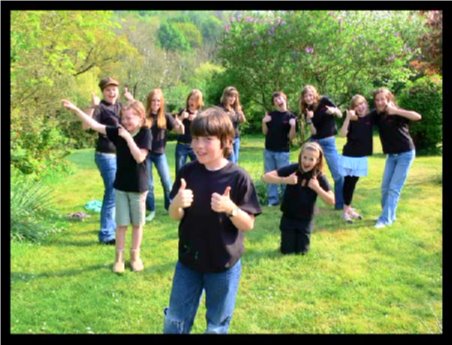The Blog for Penryn (UK) -based Kernow Youth Society for the Performing Arts. Our society is open to young people aged 9 upwards from the Falmouth and Penryn area. Our aim is to allow members to explore their interest in the performing arts through drama and film activities. KYSPA has a strong citizenship theme with activities aiming to promote self confidence, teamwork and communication skills.
Saturday, 21 April 2007
Youth Group Residential Visits.... Don't Panic!
The residential visit is fast becoming an endagered activity. Increasingly organisations, including schools, regard residential visits as a "high risk" activity involving massive bureaucracy, stress and an increased chance of getting sued. To be sure, there have been several high profile examples of residential visits which have gone tragically wrong but although residentials do take quite a bit of work, they are an incredibly enjoyable and rewarding thing to do. In short, don't panic.
Residentials are a popular aspect of KYSPA's work and we'd strongly recommend them to any youth group. They promote a particular sense of team work, create great memories and strengthen friendships. They are also a key tool in creating partnerships with groups and organisations elsewhere in the country, allowing a greater range of activities and experiences for our members.
The first step in planning a residential visit is risk assessment. This isn't rocket science and need not take a huge ammount of time but it does need to be thorough. At KYSPA we organise the risk assessment chronologically with the timetable of activities, taking each stage in turn.
Initially, thought is given to transport - usually minibus - and issues relating to the journey. For the most part this is common sense stuff (seatbelts, checking doors are secure before moving off etc.). But thought also needs to go into managing stops at busy service areas; parking the vehicle somewhere with good visibility and less traffic for instance. Thought is routinely given to action we would take in a breakdown. Do we stay with the vehicle (mostly) or move out and away from the vehicle (motorways and fast duel carriageways)?
As a general rule we expect our young people to remain with at least one other party member at all times, whether in a service area, the residence or at the activity venue. This basic security principle ensures that members cannot become totally detached from the rest of the party. We arrange a meeting point at all stops or venues in case of separation and conduct regular number checks.
For the most part, any activity we undertake on residential is no different to our usual film making or drama work. If we've got an external organisation running an event for us, we obtain a copy of their risk assessment and relevant policies. That just leaves the need to consider whether the venue you are intending to use contains any specific risks. KYSPA does not undertake any of the "high risk" activities, such as rock climbing, sailing etc as these fall outside of our performing arts remit.
Picking suitable residential accommodation is very important, particularly in the wake of the Caroline Dickinson tragedy. Good practice dictates that the party should be slept in rooms as close together as practicable with the adult leaders immediately to hand. Most accommodation which houses young people (YHA for instance) will provide you with an advance copy of their in-house risk assessment for you to read. You should demand this unless you want to visit the location yourself in advance (not too bad if its local, a pain if its a full day's drive away!). Always consider who else will be in the accommodation with you and what extra security measures need to be considered. These need to be clearly communicated to your young people. As well as the obvious matter of securing rooms (and windows) at night, give thought to night-time trips to communal toilets. The young people should make sure someone knows they are leaving the room and, if possible, accompany them.
Communication with parents is important and serves a dual purpose. As a parent myself, I would expect to have an itinerary, kit list and some briefing material on H&S issues, including child protection, associated with the trip. Providing this information to our parents involves a degree of thought and advance planning - an investment which really helps once you're on the trip. As a rule, at KYSPA we compile a visit folder for each residential, containing all our briefing material, copies of the membership forms (contact details, medical info, consent for images etc) and risk assessments. This is looked over by the Trustees ahead of the visit and parents are invited to view the documents too if they wish.
From a legal point of view, the duty of trip leaders, and the wider organisation, is to take "reasonable care" in anticipating and minimising risk. For example, although I hold a driver's license which allows me to drive a minibus, I also hold, and will maintain, a certificate in minibus driver improvement from Cornwall's Road Safety Unit. Like any organisation, we need to have statutory First Aid provision so any residential visit will have a First Aid qualified staff member on it. I have undertaken Risk Assessment, H&S and Child Protection training to ensure that KYSPA is following good practice in the assessment of risk.
Finally, any organisation should ensure that their insurance provision is sound and covers them adequately. We have Employee Liability, Public Liability and basic Personal Injury provision, so that we know that in the very unlikely event of something going wrong we are well protected - our young members are also protected under the personal injury provision.
With these procedures in place, a residential visit is not something to fear but to enjoy. With the exception of the inevitable spanner in the works (closure of a main motorway for instance) the planning is taken care of, the young people and parents are well briefed and the activities will be conducted safely. Everyone, including the leaders (hopefully), will have a great time!
(PS. This theory will be put to the test as we embark on our second residential at the end of this month. Keep an eye out for future posts detailing our experiences at Lindridge House, Devon)
Residentials are a popular aspect of KYSPA's work and we'd strongly recommend them to any youth group. They promote a particular sense of team work, create great memories and strengthen friendships. They are also a key tool in creating partnerships with groups and organisations elsewhere in the country, allowing a greater range of activities and experiences for our members.
The first step in planning a residential visit is risk assessment. This isn't rocket science and need not take a huge ammount of time but it does need to be thorough. At KYSPA we organise the risk assessment chronologically with the timetable of activities, taking each stage in turn.
Initially, thought is given to transport - usually minibus - and issues relating to the journey. For the most part this is common sense stuff (seatbelts, checking doors are secure before moving off etc.). But thought also needs to go into managing stops at busy service areas; parking the vehicle somewhere with good visibility and less traffic for instance. Thought is routinely given to action we would take in a breakdown. Do we stay with the vehicle (mostly) or move out and away from the vehicle (motorways and fast duel carriageways)?
As a general rule we expect our young people to remain with at least one other party member at all times, whether in a service area, the residence or at the activity venue. This basic security principle ensures that members cannot become totally detached from the rest of the party. We arrange a meeting point at all stops or venues in case of separation and conduct regular number checks.
For the most part, any activity we undertake on residential is no different to our usual film making or drama work. If we've got an external organisation running an event for us, we obtain a copy of their risk assessment and relevant policies. That just leaves the need to consider whether the venue you are intending to use contains any specific risks. KYSPA does not undertake any of the "high risk" activities, such as rock climbing, sailing etc as these fall outside of our performing arts remit.
Picking suitable residential accommodation is very important, particularly in the wake of the Caroline Dickinson tragedy. Good practice dictates that the party should be slept in rooms as close together as practicable with the adult leaders immediately to hand. Most accommodation which houses young people (YHA for instance) will provide you with an advance copy of their in-house risk assessment for you to read. You should demand this unless you want to visit the location yourself in advance (not too bad if its local, a pain if its a full day's drive away!). Always consider who else will be in the accommodation with you and what extra security measures need to be considered. These need to be clearly communicated to your young people. As well as the obvious matter of securing rooms (and windows) at night, give thought to night-time trips to communal toilets. The young people should make sure someone knows they are leaving the room and, if possible, accompany them.
Communication with parents is important and serves a dual purpose. As a parent myself, I would expect to have an itinerary, kit list and some briefing material on H&S issues, including child protection, associated with the trip. Providing this information to our parents involves a degree of thought and advance planning - an investment which really helps once you're on the trip. As a rule, at KYSPA we compile a visit folder for each residential, containing all our briefing material, copies of the membership forms (contact details, medical info, consent for images etc) and risk assessments. This is looked over by the Trustees ahead of the visit and parents are invited to view the documents too if they wish.
From a legal point of view, the duty of trip leaders, and the wider organisation, is to take "reasonable care" in anticipating and minimising risk. For example, although I hold a driver's license which allows me to drive a minibus, I also hold, and will maintain, a certificate in minibus driver improvement from Cornwall's Road Safety Unit. Like any organisation, we need to have statutory First Aid provision so any residential visit will have a First Aid qualified staff member on it. I have undertaken Risk Assessment, H&S and Child Protection training to ensure that KYSPA is following good practice in the assessment of risk.
Finally, any organisation should ensure that their insurance provision is sound and covers them adequately. We have Employee Liability, Public Liability and basic Personal Injury provision, so that we know that in the very unlikely event of something going wrong we are well protected - our young members are also protected under the personal injury provision.
With these procedures in place, a residential visit is not something to fear but to enjoy. With the exception of the inevitable spanner in the works (closure of a main motorway for instance) the planning is taken care of, the young people and parents are well briefed and the activities will be conducted safely. Everyone, including the leaders (hopefully), will have a great time!
(PS. This theory will be put to the test as we embark on our second residential at the end of this month. Keep an eye out for future posts detailing our experiences at Lindridge House, Devon)
Subscribe to:
Post Comments (Atom)



No comments:
Post a Comment